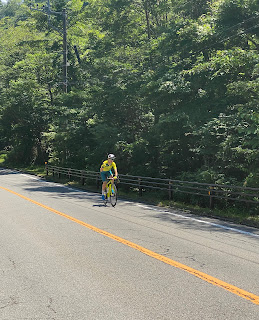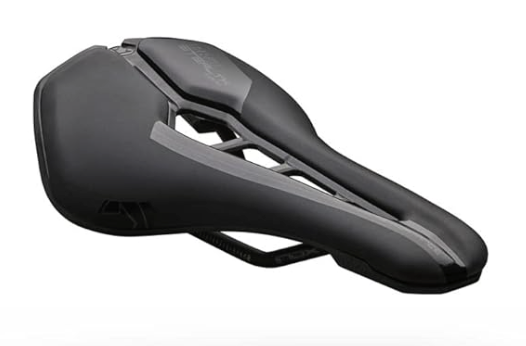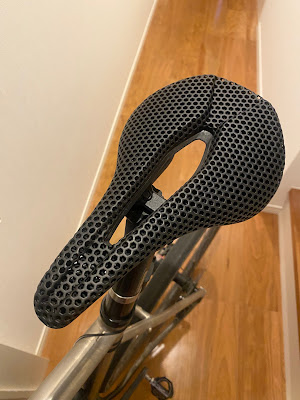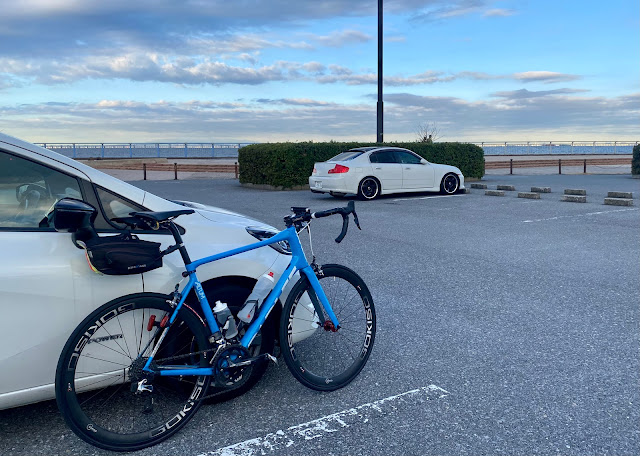 |
| At the start |
I injured my wrist on July 27, 2023, and the recovery has been longer than it should have taken.
After a negative x-ray, and 10 days for my bruised ribs to recover, I started to ride again. But my wrist felt tender. I could not put my full weight onto it without significant pain. I got a wrist brace, tried to adjust my riding position, and hoped for the best.
After a trip to France and a DNF at Paris Brest Paris, and a couple weeks off the bike to see if it would fully heal ... it was no better. So back to a (different) orthopedist. This time, the x-ray showed a scaphoid fracture, confirmed by a CT scan. The "non-union" fracture would need surgery. After another overseas trip, I had surgery at the end of September, with a 25mm bolt inserted to hold the two pieces of bone together so they would heal. They did so.
The next six weeks, as I recovered from the surgery and let the bone heal, I walked, a lot, but still gained weight.
In early November, I got on the trainer and did some Rouvy rides. On November 19, I took my first ride outside of my immediate neighborhood and short (2km each way) commute. By early December I was doing 40-55km rides several times a week. I had a week off for an overseas trip, then kept going with the shorter rides.
Finally, it was Christmas Eve and time for the "Festive 500". I rode 513kms over the last 8 days of the year, spread quite evenly with no single day longer than 110kms, and not that much climbing. But I was starting to feel more strength on the bike. My right knee complained at times in recent months with a sharp pain or some tenderness, but usually not actually while riding the bike -- more likely from twisting it a bit when getting on or off, or some other off-the-bike irregular motion. Once it got noticeably worse, or noticeably more noticeable, after a weight training session. In any event, whatever I did to it, it seems better now than a few weeks ago.
In early January, I rode to Hakone on January 3, almost 100kms, and felt pretty good. Then, on January 5, I went on from Hakone to Kofu before hopping a train to Kobuchisawa. That was a serious ride of 118kms with 2000 meters of elevation gain. First there was a steep 700 meter climb up the Old Road (箱根旧道) to the pass above Ashinoko. Then there was a shorter climb to Otome Pass. Then a long (700m+) climb from Gotemba up to Kagozaka Pass above Yamanakako. And finally there was a couple hundred meters of climbing from Kawaguchiko to the southern end of Wakahiko tunnel.
The following day I added 103kms getting most of the way back to Tokyo. All of this had me feeling like I was just about ready for the first brevet of the year when January 13 rolled around.
 |
| Over 100 riders total. |
 |
| Jerome readies. |
For this, I had chosen AJ Chiba's Flower Line 200km, held January 13 this year. For a winter brevet, the course looked great, with much lower traffic volumes and more rewards (lovely sea coast, beautiful "satoyama" countryside) than the typical Kanto winter 200km. It was, indeed, a lovely course.
Jerome joined, and was allowed to register on the spot, a courtesy from the organizers who know him well from his many Chiba rides. We got stuck in traffic on the Aqua Line both directions, but at least the outbound delay was modest.
The forecast was for excellent weather ... until mid-afternoon. Then the temperature would plunge and we would get some precipitation and a wind from the North. So my plan was not to dawdle, no long lunch, just a purposeful ride. Indeed, there were 3 climbs, 2 of them relatively short, to just over 200 meters elevation, on the outbound leg, and one from sea-level to nearly 350m elevation after Kamogawa on the return, 150kms into the course. I wanted to get over that last climb before the nasty weather arrived -- precipitation at that elevation could be snow or ice, and the road could quickly become difficult or impossible to ride.
So I was disappointed to learn that I (and Jerome) would start in "Wave 3". Wave 1 would go at 8AM, Wave 2 at 8:15, and Wave 3 at 8:30. The organizers offered that each wave could start immediately after the "bike check", which would be 10 minutes earlier. No reason to wait, especially as the course was 205, not 200 kms in length.
I was the first one through the Wave 3 bike check and took off as fast as I reasonably could. I wanted to get ahead of any line of riders so that I could time the traffic signals easily going through Sodegaura and Kisarazu. This was a good strategy -- Jerome caught me and stayed with me at times, but I basically was alone until more than 20kms into the course, when I passed one, then another rider from Wave 2. Of course, Jerome says that I go out too fast, and I do, and at some point in the ride we switch places and he is faster and stronger than I am. But this time I had good reason, and I was happy to get a good average speed (>28kph) on my Wahoo to the first checkpoint at ~37km.
 |
| Heading south with favorable winds and sun! |
After the first checkpoint, we headed for the two short inland climbs of the outbound leg. I remembered the second of these very well from a few years back, the Shiitake Mura being just below the Pass. I still felt that all was okay. No physical complaints and the equipment was working well. Except for my GPS track of the ride. Usually I will "copy" a ridewithgps track to my account then make sure it is synced to my Wahoo unit. But this time I just "pinned" the organizers' track. That should achieve the same result, but this time even though Wahoo showed a 205km route, the route track ended at the first checkpoint. I tried reloading it in various different ways using the iPhone apps from ridewithgps and Wahoo, but I could not get it to show on the Wahoo, even though I could see it on my iPhone. But during the ride my iPhone was stowed in my back jersey pocket, inside a vest and, later, a rain shell. And I could not operate the iPhone (if I did take it out) without removing my winter gloves ... never easy to get them off and on again at the drop of a hat. Oh well, at least from here the course would have relatively few twists and turns, and I could memorize most of them from PC to PC, and follow visible riders at times.
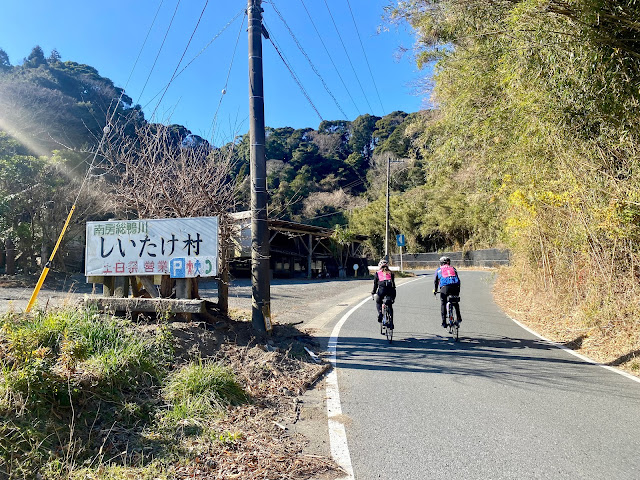 |
| Shiitake Village climb |
We got to Tateyama, started along the coastline around the southern tip of the Boso Peninsula, and could see Kanagawa's Miura Peninsula across the bay. A second checkpoint was at 82km -- by now after the climbs Jerome was riding ahead of me, and when I arrived he was already eating a large 7-11 spaghetti. I was not so hungry, but opted for a smaller rice "doria", and put a 7-11 chicken sandwich in my rear jersey pocket for later. Even the "doria" was probably too much carbs at that point, and I felt a bit bloated for the next stretch until I could fully digest.
As we left the PC, Jerome said "next PC at 142km". Both the organizer rep (who was standing there) and I immediately corrected him -- nope, there is a photo checkpoint at "Aloha Garden", 12 km on, at km 94-95. It was not listed in the brevet card, but was on the cue sheet. We were off and pretty much rode together to the photo check. But I was struggling a bit to keep up. I told him to go on ahead so we could each stick to our own pace. I needed that to fully digest the "doria".
It worked. I felt decent and made decent time all along the southern coast of Boso. It was beautiful and as dramatic as this flat coastline ever gets. Even better, the wind was generally from our backs -- from the southwest -- as we proceeded. This can be a difficult stretch with a stiff headwind.
 |
| On the southern coast of Boso - the "Flower Line" |
 |
At least the sea walls have murals on them. My bike butts heads with the shark.
Makes me wish that I had been RIDING a shark. |
It was just after 3PM when I pulled into PC3 at Kamogawa. 142kms in 6 hrs and 40 minutes. I was on pace for a 9hr 45min time -- fast for me for a winter brevet, whether due to the course and relatively favorable winds, my equipment (the "Sky Blue" Parlee and smooth-as-silk Gokiso wheels), or my conditioning rides over the year-end/New Year. One rider put on rain pants, rain jacket, helmet liner, etc. before she headed out. I said "if I put on my rain gear, I will get hot, and guaranteed the rain will stop".
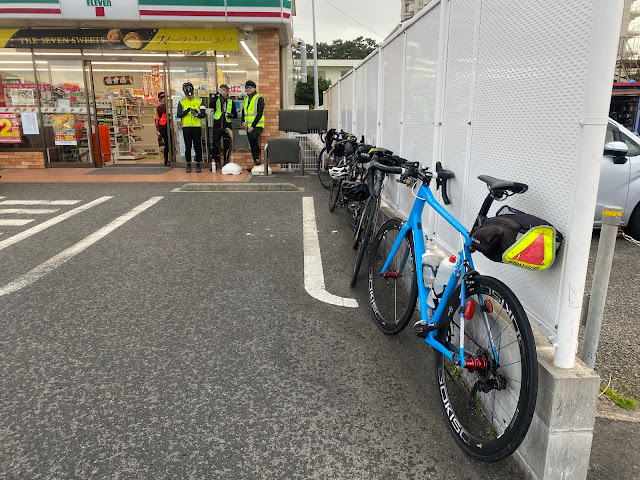 |
| Some rain drops now--pavement turning dark and damp. |
As I approached Kamogawa, there were some raindrops ... but not so much as to require rain gear over my winter gear. I headed out 10 minutes later, rode out of Kamogawa and turned North to start the biggest climb of the day -- around 6 kms and 350 meters elevation. After a brief warm-up section, the climb got steep and stayed at 7,8,9, and 10 percent grades for a couple kilometers. There was even a new circular skybridge. And the rain HAD stopped, for now. I would have been very hot climbing with an extra rain layer, even as the temperature plunged.
 |
| Looking back from the sky bridge as the weather changes |
At the very top, there were 3 younger riders. I had passed them leaving Kamogawa (they waited at an odd "Y" intersection where we had the green light, as I passed). They passed me early in the climb. At the top, they were resting and putting on more clothes. The precipitation had started again -- just a few drops of nasty sleet now. I did not rest but kept going. After a few minutes descending, I did not feel any more precipitation, and was relieved to be lower where any that fell might be less likely to stick to the road. This was it. All downhill to the finish. Mission accomplished?
Alas, it was not that easy. The sun set just as the precipitation started up again, mostly as rain, but this time, it was hard. I put on my thin rain shell, and my warmer gloves. This worked OK for awhile, but the precip had turned to "wintry mix" of snow, sleet, and rain. And the wind got stronger, stiffer, faster. By the time I was all the way down the hills and emerged from the "satoyama" area at around 170kms, the conditions were awful. I stopped once to put on my new Q36.5 rain pants. These cheered me up -- easy to fit on over my shoes (and overshoes), easy to zip tight, no straps to adjust. And they worked as promised -- kept me dry but breathed enough so they did not get covered in sweat on the inside, as most rain pants have done. They were expensive, but I was very glad I had them.
My gloves did not perform as well. My hands were nearly frozen. I tried my thick Pearl Izumi winter gloves ... soaking wet now. I could not even get my hands back into them after a stop. So I went back to the Q36.5 Amfib gloves. They are okay in dry conditions down to many 3-4 degrees C, and they are somewhat water-resistant, but they were soaked, and my hands got cold, frozen cold. The headwind was vicious. I had long ago taken off my glasses so that I could see better in the dark/rain. But sleet or snow would hit my eye and temporarily blind one side or the other. I needed to squint and dry not to look directly into the tempest. I finally got to a 7-11 and pulled off for a cup of coffee, a quick check of the iPhone, and a change back to the thick Pearl Izumi gloves. As I emerged and remounted, I could barely make progress to the North, and was getting pummeled with wet snow. The road was full of puddles.
It was a long slog north the next 15 kms or so. Several times I needed to dismount, the wind was so strong I could barely turn over the pedals, even in a very light gear. I heard claps of thunder amid the wet snow and sleet. Thunder snow! At a second 7-11 stop during this stretch, to check my iPhone/map and warm a bit, I got word now that Jerome had finished.
Anyway, the route finally made a left turn at 193kms. I was all alone, but could get the turn and continue now with a cross wind (and some protection from nearby trees, buildings, hill) west toward the bay and finish.
Just as the course reached a "T" intersection, and I faced a need to guess my direction, two riders passed me. I followed as they made the right turn, then continued straight at the next intersection. I could follow them a few more kms until we reached familiar territory and I knew the route. We caught another group of 3-4 riders. I got behind at a traffic light, but caught up a bit on a long, straight stretch along the bay, straight into the nasty wind -- a reminder of what we had faced previously. But at the end of the stretch was our goal, a parking lot, the organizers, and, in my case, a car that was already warmed up and waiting. The organizer checked my brevet card. My time was 10 hrs and 50 minutes -- not fast, more than an hour behind Jerome, way way too late to "beat the weather" as I had hoped, but still way, way ahead of the 13 hr 30 minute cutoff and, considering the weather, not bad at all. I asked if he wanted to see the photo from Aloha Garden. "Not needed, not today". He was as cold as we were.
After grabbing a quick bite with Jerome at a fast food place in Sodegaura, I drove home. The Aqua Line had a 40kph speed limit due to cross-wind restrictions on the return. In fact, we were sitting in traffic until after the bridge becomes a tunnel, so no worry about exceeding 40kph!
But all in all, a very successful start to the 2024 brevet season for me. How often do I get a real adventure like that on a 200km brevet? Not often!
 |
| Our route was counter-clockwise. |

















